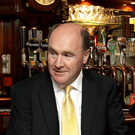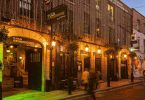DIGI makes case for alcohol tax reduction in Budget
DIGI Chairman Kieran Tobin said that in light of the report and this week’s Eurostat figures showing that alcohol and tobacco prices in Ireland are 70 per cent above the EU average, the Government should address the challenge of Ireland’s high excise rates in this Autumn’s Budget to further boost the wider hospitality sector as the new lower VAT rate does not apply to alcohol.
The Government should consider the impact these high taxes have on Ireland’s employment-intensive pubs, bars, restaurants hotels and nightclubs as well as on drinks manufacturers at a time when the wider hospitality sector is suffering major declines due to the deep recession, he said.
“Traditionally, Ireland has had some of the highest rates of alcohol taxation in the European Union. This new report shows that that position has not changed and that Ireland, along with Sweden the UK and Finland, is far out of line with average EU alcohol excise levels,” stated Kieran Tobin.
“For spirits and wine, Ireland has the third-highest tax levels in Europe and for beer we have the fourth-highest levels of the 27 EU countries. On a composite alcohol excise level, Ireland is the fourth-highest after Sweden, Finland and the UK. However the level of Irish alcohol taxation is more than double that of the fifth-ranked country, Denmark and substantially higher than all other European economies.
“In real terms, approximately 60 per cent of the price of a bottle of spirits is attributable to tax; for a bottle of wine it is approximately 30 per cent and for a pint of beer it is approximately 27 per cent,” he continued.
“In recent years these high taxes contributed to the major upsurge in cross-border shopping that led to the Government reducing excise by 20 per cent in an effort to repatriate revenue lost to the British Exchequer. That welcome pro-consumer measure clearly worked as the overall alcohol market stabilised in 2010 following near double-digit declines in 2008 and 2009, benefitting local businesses and communities who were otherwise losing custom to Northern Ireland.
“However Ireland is still among the top tier of EU countries in terms of alcohol taxation. Any increase in these already high taxes combined with a softening of the €uro/Sterling exchange rate would inevitably and immediately lead to a resurgence in cross-border shopping.
“Furthermore, given that tourism has been identified as key to economic recovery and the important role that Ireland’s pubs, bars, restaurants, hotels and nightclubs play in our tourism offering, these alcohol taxes impact on our cost-competitiveness in comparison to other major tourist destinations such as Spain, Portugal, Italy and Greece.
“With the domestic on-trade suffering double-digit sales volume and value declines and 7,000 job losses in 2010, we should be seeking to support this important employment-intensive sector and to encourage people to shop and socialise locally.
“On this basis the Drinks Industry Group of Ireland believes that the Government should take all these factors into consideration and address the challenge of high excise taxes in Budget 2012 and in subsequent Budgets in the overall context of economic recovery and the development of tourism,” concluded Kieran Tobin.

“Given that tourism has been identified as key to economic recovery and the important role that Ireland’s pubs, bars, restaurants, hotels and nightclubs play in our tourism offering, these alcohol taxes impact on our cost-competitiveness in comparison to other major tourist destinations such as Spain, Portugal, Italy and Greece.” – DIGI Chairman Kieran Tobin.








